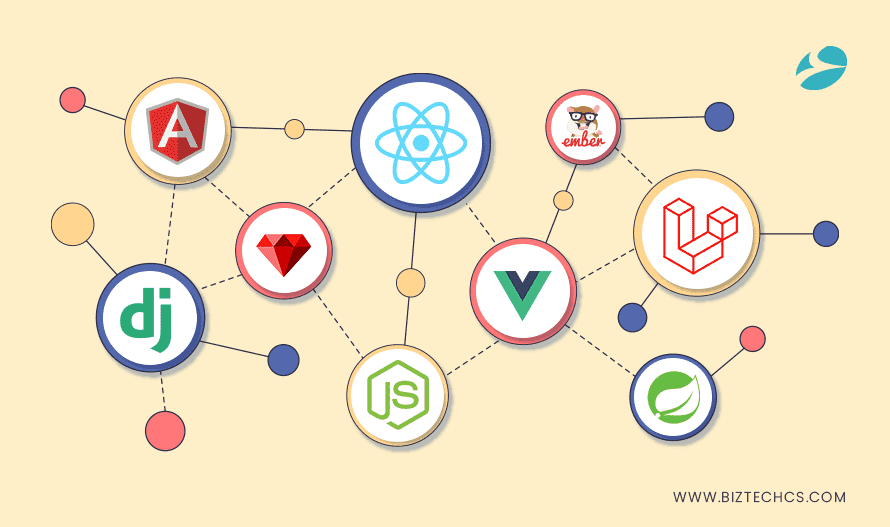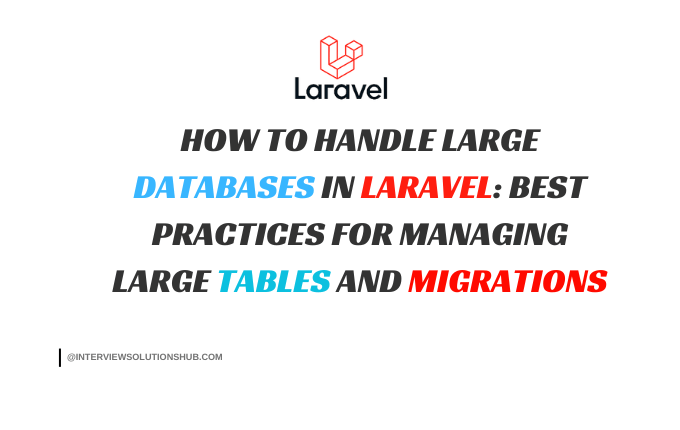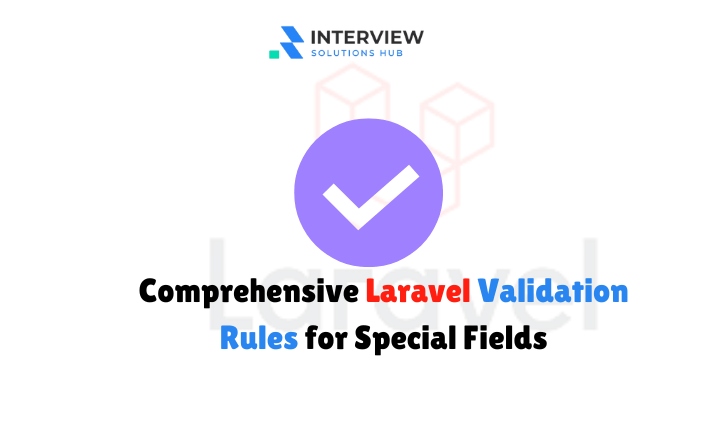How to use Job Queues in Laravel 10 step-by-step tutorial
Read More


A web framework, also known as a web development framework, serves as a software platform for creating websites, web APIs, and other web resources. This article explores various web frameworks, their types and advantages, and how to build a successful career in web development.
A web framework simplifies web development by offering a library of prewritten code, components, and templates. It aids developers in crafting web applications, products, and services for online deployment.
Web frameworks are classified into front-end and back-end categories, catering to different aspects of web application development.
Frontend frameworks focus on user-facing elements, ensuring user-friendly interfaces and engaging experiences for web applications.
Backend frameworks handle the server-side functionality of web applications, minimizing conflicts and ensuring smooth operations.
Web development frameworks offer several advantages, including streamlined development, error identification, ease of maintenance, shorter code, enhanced security, and cost-effectiveness.
Explore a list of the top web frameworks to master in 2023, enabling you to excel in web development.
This is one of the best web frameworks that can be used for web development. jQuery is a JavaScript framework that makes the task of web development very easy and simple. With the help of this framework, it becomes very easy to manage animations and events on a website or application. However, this framework has some debugging issues that may sometimes create problems.
React is an open-source JavaScript library that can be used to develop user interfaces for web applications. In other words, React is most suitable for developing the frontend of a website or a web application. The problem is that it is best for developing single-page applications.
Ember is another JavaScript framework that is used to create modern web apps and is suitable for usage by ambitious web developers. Although Ember can be used for both front-end and back-end web development, it is difficult to learn.
Ruby on Rails, a dynamic web application framework created by David Heinemeier Hansson, is ideal for creating high-speed applications. This framework's applications are often 10 times quicker than traditional Java frameworks. It is regarded as one of the greatest backend frameworks, containing everything required to develop a database-driven application. The Ruby programming language serves as the foundation for the framework.
Websites developed using Ruby on Rails include GitHub, Groupon, Airbnb, and Shopify, to name a few.
A reliable backend web development framework, Django was created in 2005 by Adrian Holovaty and Simon Willison, who preferred its super-fast, secure, scalable, and versatile nature. Django is a Python-based MTV (Model-Template-View) web framework that offers every feature needed for rapid application development.
Some of the world’s biggest websites developed using Django include Pinterest, Instagram, Spotify, YouTube, Quora, etc.
This framework by Google is considered one of the top web frameworks for frontend development. Angular is JavaScript-based, open-source, and highly in demand to construct robust, high-performance web applications. Its applications are easy to build and maintain, so numerous apps have been built with Angular.
Some of the most popular websites using Angular are Upwork, Netflix, PayPal, Lego, etc.
Developed by Microsoft, ASP.NET is extremely helpful for building dynamic web applications for mobile devices and PCs. This lightweight, high-performance framework uses.NET to develop web applications and is preferred for its speed, productivity, and power. The language used is C#.
Famous websites built using ASP.NET are TacoBell, GettyImages, and StackOverflow.
Developed in 2011 by Taylor Otwell, Laravel stands for simplicity, elegance, and readability. It works on an MVC architectural model and uses the PHP language. Laravel has API support and includes several features, like dependency injection and server-side rendering, that have increased its reach.
Laravel is the chosen framework for websites including Neighbourhood, Deltanet, Travel, etc.
Choose this framework for creating real-time web and mobile apps in quick time. Features like instant prototyping and cross-platform code generation for iOS, Android, desktops, and browsers have made Meteor JS, or Meteor, one of the top web frameworks for 2022. Its cloud platform is called Galaxy, which remarkably simplifies scaling, deployment, and monitoring.
Meteor is JavaScript-based and has been used in WishPool, HaggleMate, and Telescope.
Express, an open-source backend framework, is based on the Java programming language. It is hugely popular as one of the best web development frameworks that is minimal and flexible for backend development using Node.js. It is one of the main Express components of the standard software bundle.
Leading websites implementing Express are Accenture, Myntra, Uber, MuleSoft, and others.
Developed by Pivotal Software, Spring is one of the most used web frameworks for enterprise Java. It is best suited to build simple, flexible, and fast systems and applications. The enterprise-grade, server-side Spring framework is playing a key role in making Java popular in this age of cloud computing.
Websites using Spring are Deleokorea, MIT, Zillow, Mascus, etc.
A modern web development framework written in Java and Scala, PLAY follows MVC architecture and is regarded as a high-velocity framework. Some of the features that made the framework much loved and used include hot code reloading, hit refresh workflows, powerful consoles, and build tools.
Prominent websites that use PLAY are LinkedIn, Coursera, and LendUp, to name a few.
Vue is an open-source frontend JavaScript framework for developing user interfaces and single-page applications very quickly. This flexible framework allows developers to build apps supported by multiple browsers. Vue is regarded as one of the best UI frameworks for Vuejs, having features like an easy-to-use API, several built-in themes, and a scalable UI component library.
Websites using Vue are GitLab, Grammarly, 9GAG, and Behance, among others.
Advantages of Using Frameworks: Boosting Web Development Efficiency
Tool Integration: Frameworks seamlessly integrate tools, streamlining the development process and reducing the time spent on manual tasks.
Error Detection and Handling: Built-in error detection features help identify and rectify issues early in the development phase, ensuring a more robust and reliable end product.
Easy Maintenance: Frameworks provide a structured environment, making it easier to maintain and update code as projects evolve or new features are added.
Concise Code: Frameworks encourage the use of best practices and standardized coding patterns, resulting in cleaner and more concise code that is easier to understand and work with.
Security Improvements: With security features embedded in the framework, developers can build applications with enhanced protection against common vulnerabilities, safeguarding sensitive data.
Cost Reduction: The efficiency gained through frameworks translates into time and cost savings, making development more economical without compromising quality.
Choosing the Right Framework Architecture for Your Project
Selecting the appropriate framework architecture is crucial for tailoring your project to specific needs.
Single-Page Applications (SPA): Ideal for responsive and dynamic user interfaces, SPAs load a single HTML page and dynamically update content as the user interacts with the application.
Microservices Architecture: Perfect for large-scale applications, microservices break down complex systems into smaller, manageable services, promoting scalability and ease of maintenance.
Serverless Architecture: Optimal for cost-effective and scalable solutions, serverless architectures eliminate the need for traditional server management, allowing developers to focus solely on code functionality.
Carefully assessing your project requirements will guide you toward the framework architecture that best aligns with your goals.
Building a Successful Web Development Career: Steps to Follow
Master Essential Languages and Skills: Excel in core programming languages and key development skills to build a strong foundation for your career.
Educational Background: Consider pursuing a bachelor's or master's degree in relevant fields like computer science, software engineering, or web development to deepen your theoretical knowledge.
Hands-on Experience: Gain practical experience through internships, personal projects, or contributions to open-source initiatives to apply theoretical knowledge in real-world scenarios.
Certifications: Acquire industry-recognized certifications to validate your expertise and stand out in the competitive job market
Web development frameworks empower developers to create efficient and user-friendly web applications. By mastering these frameworks and honing your skills, you can forge a rewarding career in the ever-growing field of web development.
Recent posts form our Blog
.png)

.png)



0 Comments
Like 0